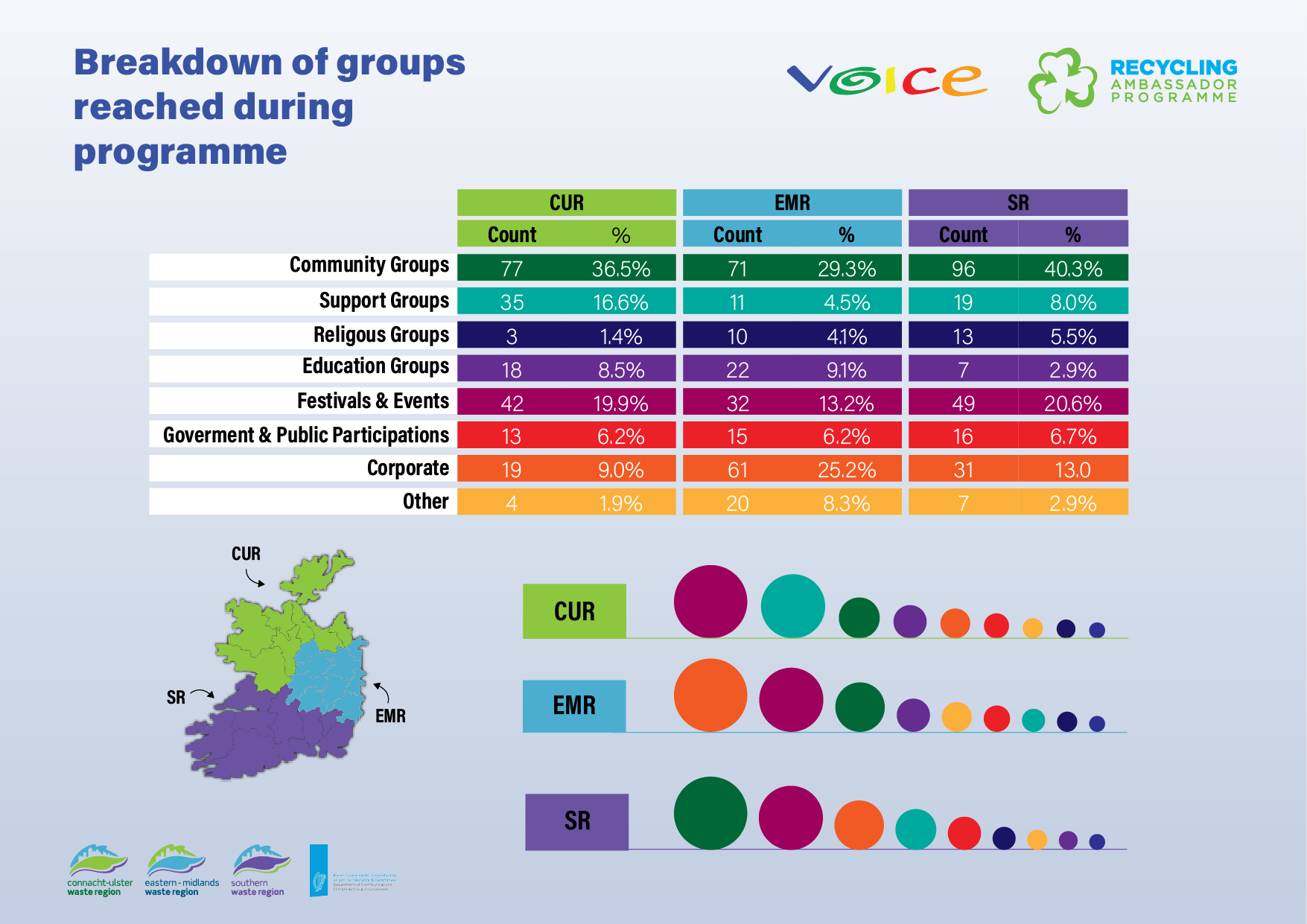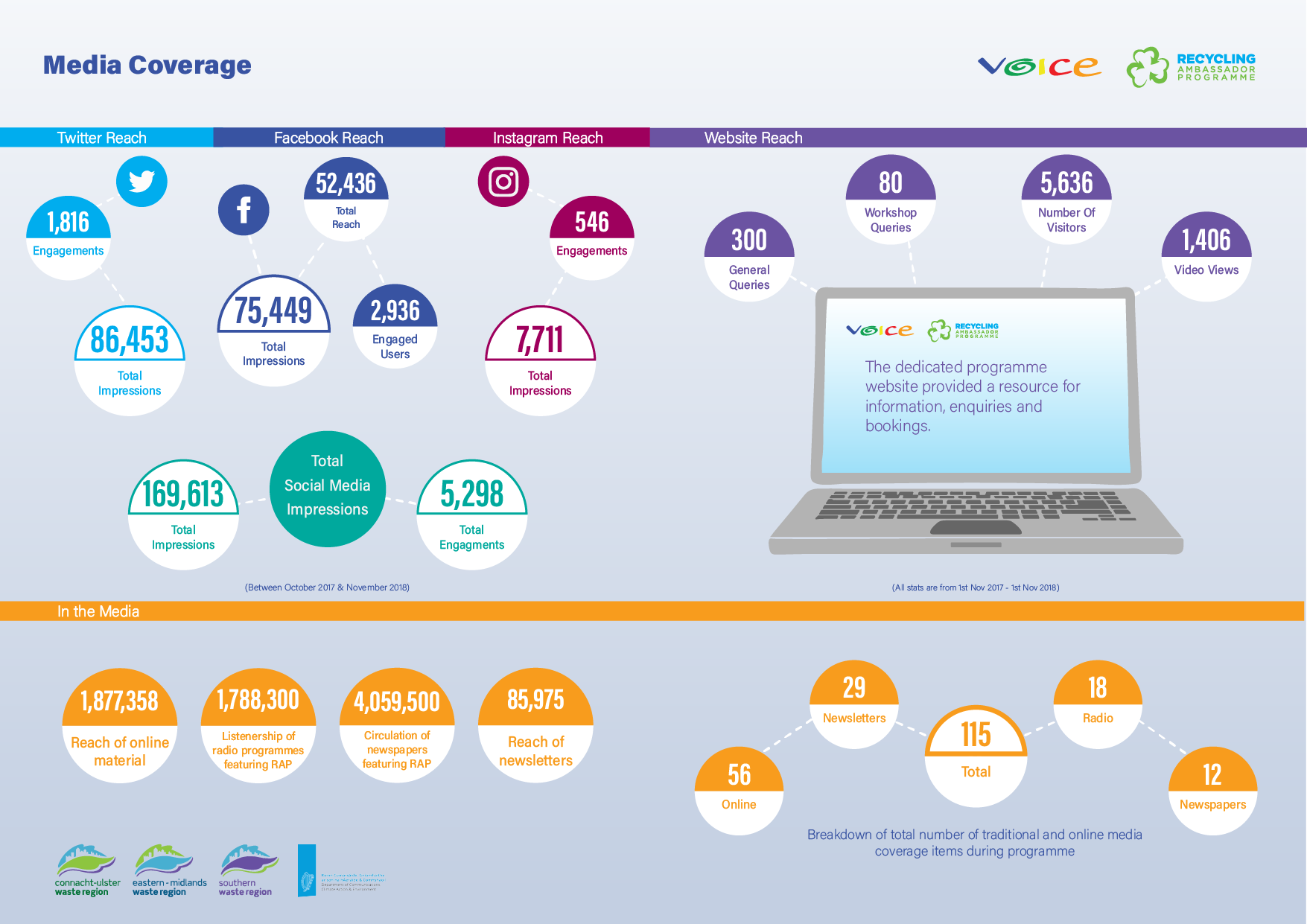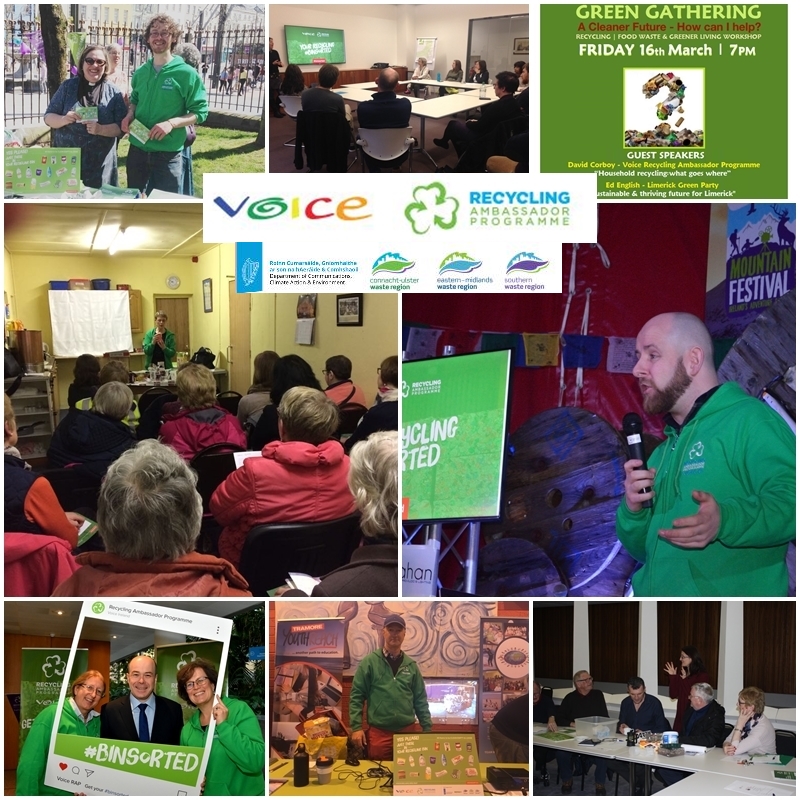VOICE Recycling Ambassador Programme, A peer to peer based social marketing and learning initiative addressing the 12th SDG through improving recycling rates and reducing contamination of recyclable materials.
Description
Ireland generates 560kg of waste per person per annum including 61kg of plastic waste, above the EU average. While Ireland is meeting current recycling targets, significant effort is required to meet the goals of 2030 and 2050.<br />
Two key issues for recycling in Ireland have been identified: historical confusion over materials accepted, and high rates of contamination in the household recycling bin. <br />
The introduction of the first unified recycling list in Ireland offered the chance to inform the public on what was accepted and reduce contamination levels using a mixture of traditional and social marketing approaches over 1 year.
The objects of the programme were to increase recycling rates and reduce contamination of recycling in Ireland. This was achieved through informing and engaging communities, businesses and groups across Ireland on issues of recycling, waste and waste minimisation. This was achieved through 3 actions. <br />
1. A series of workshops with communities across the country,<br />
2. The Recycling Behaviours and barriers Survey, to understand perceived behavioural barriers to greater involvement in recycling<br />
3. The REPAK Community Grant, to encourage further conversation on recycling and fund a specific sustainability themed action.<br />
This programme was the first peer to peer social marketing initiative run on waste and recycling in Ireland, by using all three aspects of the scheme, new social norms were encouraged and sustainable mindsets were encouraged across the country. <br />
<br />
The programme put into place a series of workshops run by local ‘ambassadors’. As such it was able to engage communities through out the country. <br />
By employing local ambassadors to present the programme we were able to tap into local knowledge and reach local groups. Ambassadors were also versed in local issues and communities. <br />
The programme brought together for the first time the industry stakeholders, the government and citizens through the workshops. As a face to face workshop, the programme encouraged interaction between the stakeholders and communities. Bringing each of these stakeholders together through the Recycling Ambassador Programme an iterative learning process was encouraged and developed.<br />
<br />
Through using a team of local facilitators the workshops allowed the learning outcomes to be tailored to the needs or issues in each area while still addressing the overall themes. Through funding from the Regional waste offices the workshops were offered for free, this allowed us to present to smaller groups and communities who would not normally be able to access such initiatives. A strict quota was in place in order to ensure audience targets were met, as a result of these we were able to reach marginal groups and societies without the same attendee requirements, but still meet the over all target requirements. <br />
<br />
Importantly the workshops allowed a space for conversations on waste and resource use to begin. Recognising this VOICE secured extra funding from industry partner REPAK which was in turn given out to community groups and clubs to undertake community actions that built on the learnings of the workshops. <br />
<br />
Finally throughout the programme the Behaviours and Barriers Survey was given to participants. This gathered information on what individuals across the country perceived as the main issues in their attempts to recycle. Using the theory of reasoned action as a guideline, the questionnaire looks to examine the perceived control, norms and attitude towards recycling which in turn shape the intention to recycle. The data from this survey is being analysed but will help to better direct future recycling efforts.
Bringing all the major stakeholders in waste in Ireland together it questions from the workshops could be easily and comprehensively addressed.
The programme had an online presence, through it’s own website and social media.
Initiation / Set up stage;
After agreement on the new Recycling List. VOICE was tasked with co designing and delivering the recycling ambassador programme. This took place between October and November 2017.
Project manager and regional liaisons in consultation with the steering committee developed the initial materials, presentation and format for the programme. Meanwhile a process was put in place to enlist 30 ambassadors which would effectively cover the geographic spread of the programme. Ambassadors were identified as people active in a sustainable or environmental field in their locality. All ambassadors were given presentation training, and a tour of a local recycling facility, coordinated with the IWMA.
Organisation:
The steering committee, made up of industry stakeholders, government representatives, and VOICE, managed the programme and oversaw budgeting.
Project manager managed the programme day to day including budgeting, reporting and oversight. Regional liaisons managed bookings and assigned ambassadors in their areas.
Ambassadors presented workshops and provided feedback. Questions and any future leads for workshops and questions were sent back to the appropriate regional liaison. All points along the scheme were involved in developing workshop leads. Regular online meetings ensured effective communication through all levels of the programme.
Execution / implementation :
In November 2017 the programme was officially launched, which featured in national and local press. The Regional Liaison Officers working with the waste regional offices contacted local authority environmental offices to connect with their strategies and also to help advertise the workshops.
The programme being fully funded allowed the workshops to be provided for free, ensuring equality of access for all communities. An aim of 25 people attending per workshop was put in place. This target was achieved primarily by encouraging the workshop to be part of a pre-organised meeting of the group or community, ensuring that the information reached not just those with a pre-existing interest. This allowed for less stringent number quotas to be applied in cases where the community represented a hard to reach or otherwise marginalised community. Ambassadors were each assigned to do 3 workshops per month, and were paid per workshop with an allowance for travel.
Appropriate reimbursement of ambassadors for the work was a major aspect as it assigned a value to the work.
Throughout the year at workshops attendees were asked to fill in the Behaviours and Barriers survey, these were relayed to the Data manager who digitised the surveys and entered into the CRM system.
Monitoring:
Monthly targets were set for number of workshops run per region, and tracked through Salesforce CRM. Monthly meetings of the programme team and quarterly steering committee meetings ensured consistent progress was made, and issues rectified. These allowed a chance to reflect on demographics, areas or opportunities that may have been under represented or should receive focus for the coming month.
The workshops acted as an iterative learning opportunity, allowing communities to ask questions important to them, and offering a way for these issues to be addressed and answered. This also helps to identify common questions and avenues for further development.
Within the process of the workshop individuals were empowered to ask questions about recycling and encouraged to interact with the ambassadors on any aspects they had questions about. This established recycling as a social norm and as a positive habit within this context.
Through the REPAK grant scheme the programme was able to build on the workshops and encourage a sustainable themed action in that community. This scheme encouraged conversation on recycling in the area through the distribution of questionnaires among members of the community who may not have attended the workshop. This action directly funded 85 projects across the country including addressing issues related to the 12 Sustainable Development Goal such as repair cafes, reuse projects, beach and country side clean ups, and further education initiatives.
Media coverage ranged from articles on websites, events listings, local and regional newspapers articles, newsletters and radio interviews. In total 115 items of media coverage were identified during the course of the programme. This includes 12 newspaper articles, 18 radio interviews, 29 newsletters and 56 online listings.
In addition to more traditional media coverage, regular social media activity was carried out on several social media channels during the programme, including Facebook, Twitter, Instagram, YouTube and LinkedIn, both raising awareness of the programme and reporting on any significant project activity and achievements.
The combined reach of Twitter, Facebook and Instagram was 169,613 impressions and 5,298 engaged users with 380 queries by the end of the November 2018. YouTube also made a significant contribution to awareness raising and the promotion of the programme. An online instructional video, made in conjunction with the Irish Times, was published on the 18th of April 2018 and received over 2,400 views on the RAP YouTube page. Furthermore the video has been viewed over 135,000 times on the Irish Times YouTube channel and had an even wider reach with over two thousand shares online across social platforms such as LinkedIn, Facebook and Twitter. The programme also featured at the Creative responses to Climate change conference, held b the French Embassy in Ireland and supported by Trocaire.
In order for the programme to be a success, a number of factors had to be in place. The programme had to be run across all of Ireland, it had to have the backing of the industry stakeholders, and it had to be presented by passionate ambassadors who could engage with audiences up and down the country.
The programme was a success because it brought together the strengths of both the government and the NGO sector. Utilising the connections which VOICE had allowed a quick set up process of passionate ambassadors across the country who were able to work within their own communities. The waste regional offices were able to fund this work, and also create links with local governmental structures, and give the programme a legitimacy. Through the involvement of the Waste Industry, the ambassadors were able to tour local MRFs sites and become fully informed on the processing and sorting that goes into household recycling, which informs many of the decisions made.
The programme architecture is easily replicated for future environmental outreach and education initiatives. Critical to the success of this or any other project based upon it is the involvement of all stakeholders, industry groups, government and citizens. Facilitation of the workshop by a recognised NGO or charity group lends legitimacy to the message, while involvement by all major stakeholders ensured that the message was a credible and unified one.
The workshop format encourages conversation with communities and so ensures the scheme is seen not as an educational lecture but a learning opportunity.
Continued involvement by all stakeholders in responding to community questions (via the regional Liaisons) and encouraging future action (through the grant) allows communities and citizens to feel they are being engaged in an ongoing conversation which enables them to move forward after the workshop.
The programme was the first peer to peer social marketing programme addressing sustainability issues in Ireland, connecting individuals with stakeholders for the first time in respect of Recycling in Ireland.<br />
<br />
The programme developed an iterative learning process which allowed it to continue to address concerns and issues as the programme progressed.<br />
Through encouraging face to face conversation with trained ambassadors we were able to create new social norms and breakdown some of the traditional barriers to behaviour change.The programme was consistently praised for addressing a real knowledge gap. <br />
<br />
Through the grant scheme we have made real changes in sustainability in communities across the country, and through featuring these schemes on our social media we've helped to spread those ideas and experiences. With the Survey we have encouraged conversations and will soon have data which can help to inform future recycling policy in Ireland. <br />
<br />
We reached 25,000 people through the hard work of all of the partners each bringing their strengths to the table.<br />
<br />
The Recycling Ambassador Programme informed, engaged and enabled people to take part in sustainability actions all across Ireland.
Facebook : https://www.facebook.com/Recyclingambassadorprogramme/
Youtube : https://www.youtube.com/user/voiceireland/playlists
https://www.youtube.com/watch?v=sZZsBedy0CU
Media links : https://www.irishtimes.com/news/environment/consumer-guide-to-what-s-re…
http://greennews.ie/nationwide-recycling-initiative-fueled-local-public…
https://ie.ambafrance.org/A-day-to-discuss-creative-responses-to-fight-…
SDGS & Targets
Deliverables & Timeline
Resources mobilized
Partnership Progress
| Name | Description |
|---|
Feedback
Action Network


Timeline
Entity
Region
- Europe
Geographical coverage
Photos



Website/More information
Countries
Contact Information
Tad Kirakowski, Southern Regional project manager
